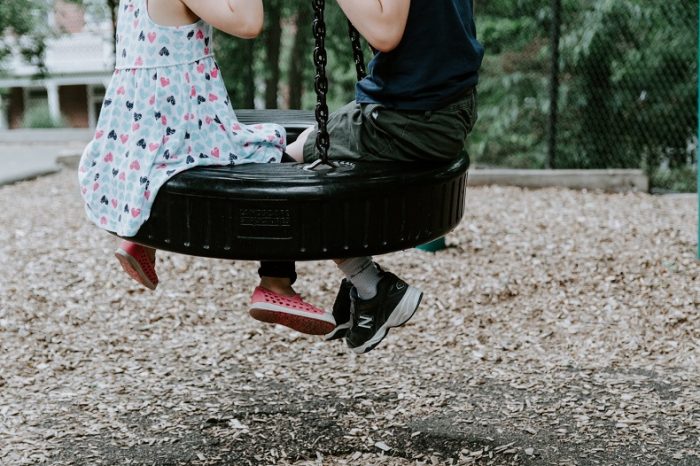“Did your brother ever bully you?” my six-year-old asks me in a hushed voice.
We are lying on the carpet in the living room, her huge blue eyes fixed on me.
I can’t tell if she’s using a soft voice because she doesn’t want her brother to overhear us, or because she’s asking me about my brother.
“Honestly? I probably bullied him more, since I was the oldest,” I admit, raising my eyebrows.
“Really?” she asks. Her eyebrows lift too. “But, did he ever bully you?”
“Oh, he definitely bugged me and irritated me. That’s part of being a brother and sister,” I say. She nods, but I sense that I’m not quite satisfying her question.
My kids are in a thick forest of sibling rivalry right now—it’s common to find them shrieking and hurling insults at each other one minute, only to be giggling and plotting an adventure together the next.
I’m tuned in to their dynamic because they’re my kids, and their spats regularly threaten my mental stability. But also? I’m tuned in because of what I’ve lost.
When I was 24, my little brother, Will, died of heroin and alcohol intoxication. I was crushed—the world, as I knew it, was over.
My parents were wrecked—our steady family, like a four-legged table that had one leg ripped off, was thrown completely off-kilter by the loss of my brother.
And yet, almost immediately, I started getting the not-so-subtle message that my loss wasn’t that bad.
“Be strong for your parents,” people urged me at my brother’s memorial service. “Tell your parents how sorry I am for their loss,” some people even said, skimming over my loss completely.
How could I be strong, I wondered, when the cokeeper of my childhood was gone? Will and I had passed hundreds of hours together, alternately arguing and snuggling in the back seat of my parents’ cars on errands and family road trips. We chased each other, skidding in our socks and screeching, across the linoleum kitchen of our childhood home. We’d sobbed together when our obese cat, Boots, died.
Beside the comfort of our shared past hulked the towering stack of “nevers” that my brother’s death brought. I would never have biological nieces or nephews. My brother would never be at my wedding, never meet my kids, never settle into a career he loved, or be there for my parents 50th wedding anniversary.
When Will died in 1999, there were no books on adult sibling loss. The fact that there were more resources available on pet loss than sibling loss added insult to injury. Combined with the comments like be strong for your parents, the lack of resources added to the feeling that I was supposed to instantly get over my loss—or at the very least, act as a splint for my parents’ overwhelming pain.
Grief therapists have dubbed bereaved siblings “the invisible mourner” or “forgotten mourner” for this reason.
But in those early months and years, my grief informed me of the importance of the sibling relationship. I felt the loss in my body like a phantom limb. I wrote letters to my brother.
Now, every day, my kids remind me why brothers and sisters are so important. The sibling competition that drives me nuts on the daily is the same reason their relationship is so precious—as siblings, we exist in the same orbit of time and space.
We know, intimately, what no one else knows: what it feels like to have our particular set of parents, to live in the same home at the same time, to experience the family rules, inside jokes, history, and quirks.
Someday, you’ll be glad you guys have each other, I want to tell my daughter when she comes to me after a fight with my son. But I try, instead, to just listen. To remember the frustration and fury, the times I’d hear the telltale click that meant Will was eavesdropping on my phone calls, or when I’d slip a pair of kitchen scissors into his bedroom door to unlock it after he’d slammed it on me.
We don’t get to choose our siblings—all too often, being born to the same family doesn’t hedge against issues that can rupture relationships, like conflicting personalities or politics. Will and I were lucky—we loved much of the same music, we had the same pitch-black sense of humor, and we were both writers, twined and twinned.
I hope that my kids, despite their wildly divergent personalities, will be close as adults, but that’s out of my hands. I only know this—there is no other relationship quite like a sibling. No one else we can expect to spend 70, 80, or more years alongside on this earth. No one else who can push our buttons so quickly or expertly, or who can trace our secrets and strengths like a well-worn map. No one else who’s so crucial to our formation, solid as a spine.
~











Read 1 comment and reply